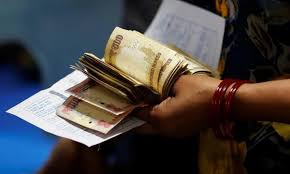As the furore and protests against demonetisation continue I have come to realise that there is no place like whatsapp, when it comes to stirring up protests or support on a particular agenda. But I guess before forwarding such responses, readers should also think logically. There is a particularly popular(I am guessing since it was sent to me no less than 50 times in one day) forward that I seek to address in this article. As an Indian I fee there are some myths that need t be broken and the truth has to be told.
The letter has been written by some “BRIAN from Godzone NEW ZEALAND” and goes on to claim that “Corruption in India is a cultural aspect. Indians seem to think nothing peculiar about corruption. It is everywhere. Religion is transactional in India. Indians give God cash and anticipate an out-of-turn reward. “
Would like to put forward to my dear friend that he has got his facts completely wrong. Money or expensive gifts are not offered to God in anticipation of out of tune reward. The concept comes from eeh ancient belief of worshipping or respecting God as one of your own and adorning them with offerings that one considers special. Moreover this money that is collected daily across temples/mosques/Gurudwaras/Church in India is also used in untold acts of Charity. The money offering also has deep connection with the Indian ethos of sharing what you have with all fellow brethren.
The next point my friend Brian chooses is , “India’s temples collect so much that they don’t know what to do with it. Billions are gathering dust in temple vaults.”
Here are some little facts for dear Brian to consider:
- The Siddhivinayak temple spends 90% of its annual income of Rs 15 crore on providing medical treatment for poor patients, running schools and helping NGOs financially.
- Only 20% of the Tirupati temple’s estimated annual income close to Rs 1000 crore is used for salaries and upkeep of the temple; the rest is spent fro upkeep of schools, leprosy homes, orphanages and free treatment at Balaji Institute of Surgery, Research and Rehabilitation of the Disabled and Sri Venkateswara Institute of Medical Science are some examples of philanthropy at Tirupati.
- At Vaishno Devi, 60% of the annual revenue close to Rs 750 crore a years is spent on the upkeep of facilities like roads, sanitation, electricity etc, for pilgrims, while 40% is reserved for future projects.
Surely then Europeans cannot take credit of the schools in India being established by them as Brian From Godzone claims. He goes on to highlight there was ‘also limited warfare in the subcontinent due to the corrupt nature of Indians”. The fact is India has been the birthplace of non-violent revolution and we have grown with the belief that one should respect all around us and even our enemies. “You do not have to pick up the gauntlet if a pen can do the work for you.” I cannot help laughing when Brian from Godzone claims, “Indian moral ambiguity towards corruption is visible in its history. Indian history tells of the capture of cities and kingdoms after guards were paid off to open the gates, and commanders paid off to surrender.” Surprisingly world history is rife with such instances across Europe, whether you talk of the Trojan Horse, Battle Of Hastings, 1848 French Revolution to the more recent Nazi war, corruption is rife across the length and breadth of European history. Are we to assume that it is the Aryan blood that flows in both European and predominantly Indian blood that is responsible for this?!
Another key fact that dear Brian highlights is, “Indians do not believe in the theory that they all can rise if each of them behaves morally, because that is not the message of their faith. Their caste system separates them. They don’t believe that all men are equal.”
Well well well, a little study into the ancient Indian history would explain that Caste system was created to achieve parity in society and ensure that a cohesive unified self sufficient village unit is in place. Just like there has been instances of it becoming a mode of oppression there are equal number of situation where reformers and common men took up the cudgels to eradicate the scourge of casteism. It only goes on to show that the root of the religion supports that all are equal in God’s eyes and whether one is a Hindu, Muslim, Sikh or Christian nowhere do the sentiments of tolerance ring as loud as in India.
Last but not the least while New Zealand is perhaps one of the less corrupt countries it does not treat people equally or else racism would not be such a massive issue. While my idea is not to bash any country, let’s understand facts can be interpreted the way we want. Let that idea not get corrupted. Most importantly for those who are forwarding this article, it was written almost a year back!!!



Leave a reply